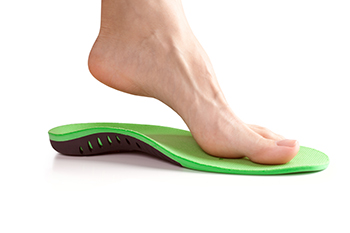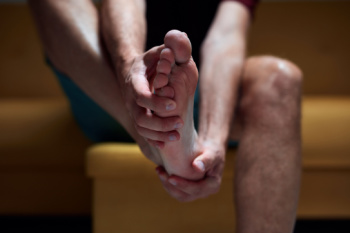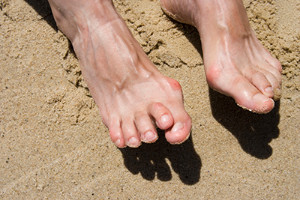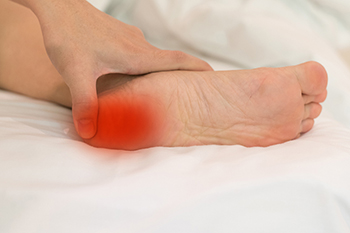Connect With Us
Blog
Items filtered by date: April 2025
Why Custom Orthotics Might Be Right for You

Shoe orthotics are not just for athletes or people with foot pain, they can benefit anyone whose feet are not functioning at their best. Custom orthotics are specially designed to support your unique foot structure, helping to correct alignment, absorb shock, and improve balance. You might need them if you suffer from chronic heel pain, arch problems, flat feet, or conditions like plantar fasciitis or arthritis. Even knee, hip, or back pain can sometimes be traced back to poor foot mechanics. Unlike over-the-counter inserts, custom orthotics are made from molds of your feet, so they address your specific needs. They can fit in many types of shoes and help reduce fatigue during everyday activities. If your feet ache or you feel unsteady on your feet, it is suggested that you see a podiatrist who can assess your gait and recommend whether orthotics could improve your comfort and long-term foot health.
If you are having discomfort in your feet and would like to try orthotics, contact one of our podiatrists from Podiatry Care Specialists. Our doctors can provide the care you need to keep you pain-free and on your feet.
What Are Orthotics?
Orthotics are inserts you can place into your shoes to help with a variety of foot problems such as flat feet or foot pain. Orthotics provide relief and comfort for minor foot and heel pain but can’t correct serious biomechanical problems in your feet.
Over-the-Counter Inserts
Orthotics come in a wide variety of over-the-counter inserts that are used to treat foot pain, heel pain, and minor problems. For example, arch supports can be inserted into your shoes to help correct overarched or flat feet, while gel insoles are often used because they provide comfort and relief from foot and heel pain by alleviating pressure.
Prescription Orthotics
If over-the-counter inserts don’t work for you or if you have a more severe foot concern, it is possible to have your podiatrist prescribe custom orthotics. These high-quality inserts are designed to treat problems such as abnormal motion, plantar fasciitis, and severe forms of heel pain. They can even be used to help patients suffering from diabetes by treating foot ulcers and painful calluses and are usually molded to your feet individually, which allows them to provide full support and comfort.
If you are experiencing minor to severe foot or heel pain, it’s recommended to speak with your podiatrist about the possibilities of using orthotics. A podiatrist can determine which type of orthotic is right for you and allow you to take the first steps towards being pain-free.
If you have any questions please contact our offices located in West Chester, and Broomall, PA . We offer the newest diagnostic and treatment technologies for all your foot and ankle needs.
Getting Help for Chronic Plantar Fasciitis

When heel pain from plantar fasciitis does not go away after several months, it is considered chronic. This condition can limit your ability to walk, work, or enjoy physical activity. A proper evaluation looks at how long the pain has lasted, what treatments have been tried, and if other issues are involved. Treatment for chronic plantar fasciitis may include custom orthotics, stretching exercises, shockwave therapy, or in some cases, surgery. Addressing the problem early and with the right approach can prevent long-term discomfort and improve your quality of life. Each case is different, so care should be tailored to your specific needs and lifestyle. If your heel pain has lasted for months, it is suggested that you speak with a podiatrist to explore long-term treatment options.
Plantar fasciitis is a common foot condition that is often caused by a strain injury. If you are experiencing heel pain or symptoms of plantar fasciitis, contact one of our podiatrists from Podiatry Care Specialists. Our doctors can provide the care you need to keep you pain-free and on your feet.
What Is Plantar Fasciitis?
Plantar fasciitis is one of the most common causes of heel pain. The plantar fascia is a ligament that connects your heel to the front of your foot. When this ligament becomes inflamed, plantar fasciitis is the result. If you have plantar fasciitis you will have a stabbing pain that usually occurs with your first steps in the morning. As the day progresses and you walk around more, this pain will start to disappear, but it will return after long periods of standing or sitting.
What Causes Plantar Fasciitis?
- Excessive running
- Having high arches in your feet
- Other foot issues such as flat feet
- Pregnancy (due to the sudden weight gain)
- Being on your feet very often
There are some risk factors that may make you more likely to develop plantar fasciitis compared to others. The condition most commonly affects adults between the ages of 40 and 60. It also tends to affect people who are obese because the extra pounds result in extra stress being placed on the plantar fascia.
Prevention
- Take good care of your feet – Wear shoes that have good arch support and heel cushioning.
- Maintain a healthy weight
- If you are a runner, alternate running with other sports that won’t cause heel pain
There are a variety of treatment options available for plantar fasciitis along with the pain that accompanies it. Additionally, physical therapy is a very important component in the treatment process. It is important that you meet with your podiatrist to determine which treatment option is best for you.
If you have any questions, please feel free to contact our offices located in West Chester, and Broomall, PA . We offer the newest diagnostic and treatment technologies for all your foot care needs.
Managing Overlapping Toes at Any Age

Overlapping toes can appear at birth or develop later in life. In newborns, the toes may overlap due to positioning in the womb or inherited foot structure. Gentle stretching and taping techniques are often used to encourage proper alignment during infancy. In many cases, the condition improves as the child grows and becomes more active. For adults, overlapping toes frequently result from wearing tight or ill-fitting shoes, arthritis, or long-term foot deformities such as bunions or hammertoes. Discomfort, corns, and difficulty finding comfortable footwear are common complaints. Non-surgical treatments may include wearing wider shoes, using toe spacers, and applying padding to relieve pressure. If pain persists or the overlap interferes with walking, surgical correction may be recommended to realign the toes and restore comfort. Whether the condition affects a newborn or an adult, it is suggested that you see a podiatrist for a proper diagnosis and appropriate treatment plan.
Hammertoes can be a painful condition to live with. For more information, contact one of our podiatrists of Podiatry Care Specialists. Our doctors will answer any of your foot- and ankle-related questions.
Hammertoe
Hammertoe is a foot deformity that occurs due to an imbalance in the muscles, tendons, or ligaments that normally hold the toe straight. It can be caused by the type of shoes you wear, your foot structure, trauma, and certain disease processes.
Symptoms
- Painful and/or difficult toe movement
- Swelling
- Joint stiffness
- Calluses/Corns
- Physical deformity
Risk Factors
- Age – The risk of hammertoe increases with age
- Sex – Women are more likely to have hammertoe compared to men
- Toe Length – You are more likely to develop hammertoe if your second toe is longer than your big toe
- Certain Diseases – Arthritis and diabetes may make you more likely to develop hammertoe
Treatment
If you have hammertoe, you should change into a more comfortable shoe that provides enough room for your toes. Exercises such as picking up marbles may strengthen and stretch your toe muscles. Nevertheless, it is important to seek assistance from a podiatrist in order to determine the severity of your hammertoe and see which treatment option will work best for you.
If you have any questions, please feel free to contact our offices located in West Chester, and Broomall, PA . We offer the newest diagnostic and treatment technologies for all your foot care needs.
We Can Treat Your Foot or Ankle Pain
Do Not Let Heel Pain Slow You Down

Heel pain is one of the most common foot complaints, and it can make every step feel like a struggle. Whether it is plantar fasciitis, Achilles tendonitis, or a heel spur, ignoring the pain usually makes things worse. The good news is that most heel pain can be relieved with the right treatment. A podiatrist can pinpoint the cause of your discomfort and create a personalized plan to get you back on your feet. Treatment options often include stretching exercises, custom orthotics, or, in some cases, minimally invasive procedures. Addressing heel pain early helps prevent long-term issues and keeps you active. If heel pain is affecting your daily life, it is suggested that you schedule an appointment with a podiatrist for a proper evaluation, diagnosis, and appropriate treatment.
Many people suffer from bouts of heel pain. For more information, contact one of our podiatrists of Podiatry Care Specialists. Our doctors can provide the care you need to keep you pain-free and on your feet.
Causes of Heel Pain
Heel pain is often associated with plantar fasciitis. The plantar fascia is a band of tissues that extends along the bottom of the foot. A rip or tear in this ligament can cause inflammation of the tissue.
Achilles tendonitis is another cause of heel pain. Inflammation of the Achilles tendon will cause pain from fractures and muscle tearing. Lack of flexibility is also another symptom.
Heel spurs are another cause of pain. When the tissues of the plantar fascia undergo a great deal of stress, it can lead to ligament separation from the heel bone, causing heel spurs.
Why Might Heel Pain Occur?
- Wearing ill-fitting shoes
- Wearing non-supportive shoes
- Weight change
- Excessive running
Treatments
Heel pain should be treated as soon as possible for immediate results. Keeping your feet in a stress-free environment will help. If you suffer from Achilles tendonitis or plantar fasciitis, applying ice will reduce the swelling. Stretching before an exercise like running will help the muscles. Using all these tips will help make heel pain a condition of the past.
If you have any questions please contact our offices located in West Chester, and Broomall, PA . We offer the newest diagnostic and treatment technologies for all your foot and ankle needs.

